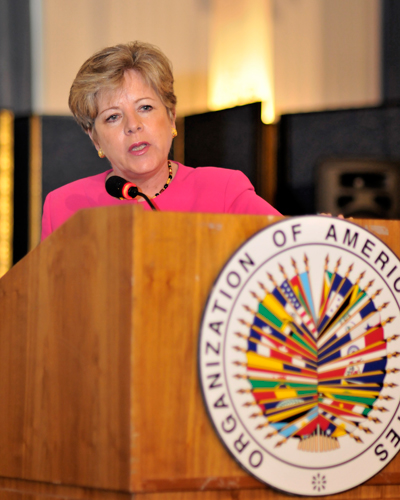Inequality Hinders Compliance of Millennium Development Goals
Two weeks before the United Nations MDG summit in New York, representatives discussed the progress made in Latin America and the Caribbean.

(8 September 2010) High-ranking officials of international and multilateral organizations agreed that inequality is one of the main obstacles for Latin America and the Caribbean to meet the United Nations Millennium Development Goals by 2015 during a round table held today in Washington, D.C.
The XXV OAS Policy Roundtable discussed the document Achieving the Millennium Development Goals with equality in Latin America and the Caribbean: Progress and challenges, which examines the current state of progress in the region towards the fulfillment of the MDGs. The report was prepared within the framework of the United Nations Regional Coordination Mechanism by 18 UN agencies, funds and specialized bodies in the region: ECLAC, FAO, UN-HABITAT, ILO, PAHO/WHO, WFP, UNDP, UNEP, UNFPA, UNESCO, UNICEF, UNIFEM, OHCHR, UNAIDS, UNOPS, OCHA, UNHCR and UNWTO, under the coordination of ECLAC.
The document, presented last July in New York, states that Latin America and the Caribbean have achieved significant progress towards fulfillment of the MDG targets and that an important part of those advances in the region as a whole - particularly in terms of extreme poverty reduction - was attained during the six years prior to the global crisis (2003-2008). During that time, Latin America and the Caribbean enjoyed relatively high growth rates and several countries improved income distribution, raised per capita social public expenditures and applied macroeconomic policies that prevented a harsher impact of the crisis.
Participating in the round table were the Secretary General of the Organization of American States, José Miguel Insulza, the Executive Secretary of the Economic Commission for Latin America and the Caribbean, Alicia Bárcena, the Assistant Administrator of the United Nations Development Programme (UNDP) and Director of its Regional Bureau for Latin America and the Caribbean, Heraldo Muñoz, the United States Assistant Secretary of State for Western Hemisphere Affairs, Arturo Valenzuela, and the Director of External Relations of the Pan American Health Organization (PAHO), Juan Manuel Sotelo.
Representatives met to discuss the issue two weeks before the High-Level Plenary Meeting of the United Nations General Assembly, convoked by Secretary-General Ban Ki-moon with the aim of speeding up progress towards the attainment of the Millennium Development Goals.
In his welcoming words, OAS Secretary General José Miguel Insulza highlighted the enormous value of the interagency report on the MDGs, "which is a clear example of what can be achieved through joint United Nations work in the region." Insulza called for "uniting positions to channel our resources, in this particular case, public policies, in the most effective way possible in order to meet the Goals and ensure that the most vulnerable participate in the benefits of democracy."
ECLAC Executive Secretary Alicia Bárcena, who presented the report, stressed that the region has advanced greatly in reducing extreme poverty and poverty in general, which is very important, "because poverty reduction is the mother of all of the targets." She underscored the advances made in Brazil, Chile, Argentina and Bolivia.
"With adequate efforts, the region can come closer to meeting the goals, especially through public policies aimed at the most vulnerable population, because poverty has the face of children, women, indigenous peoples and Afro-descendents," she stated.
Bárcena added that "employment is the key to overcoming poverty and attaining equality, as we state in our document Time for Equality: Closing Gaps, Opening Trails, in which ECLAC reasserts the value of equality as the basic foundation to achieve the economic and social progress of countries in our region."
Heraldo Muñoz stated that inequality is an obstacle to meeting the MDGs. "That's why, as ECLAC says in its document Time for Equality, reducing inequality has to be a political priority," he said.
Arturo Valenzuela stated that he welcomed the efforts being made in the region to comply with the MDGs, "as the United Nations interagency report we have discussed today indicates, but we must be aware of the challenges that lie ahead."
Valenzuela stressed the need to address the institutional deficits in the region, "because for adequate economic and social policies to work, they need strong institutions, a State with capacity for governance, management and efficiency, a rule of law and transparency in the gamerules," he said.
Juan Manuel Sotelo underscored the need to promote greater public financing for health in order to strengthen social protection in this area, as well as to strengthen social institutions so as to attain the MDGs with equality.
"Without advances in health-related goals, there will be no progress in the rest of the objectives," he stated.
For enquiries, please contact ECLAC's Public Information and Web Services Section. Email: dpisantiago@cepal.org; telephone: (56-2) 210-2040/2149.
Related content
Latin America and the Caribbean Advance Towards Millennium Goals but Doubts Remain About Full Compliance
The volatility caused by the global crisis casts doubts on the achievement of some targets.
Country(ies)
- Latin America and the Caribbean
Contact
Public Information Unit
- prensa@cepal.org
- (56 2) 2210 2040